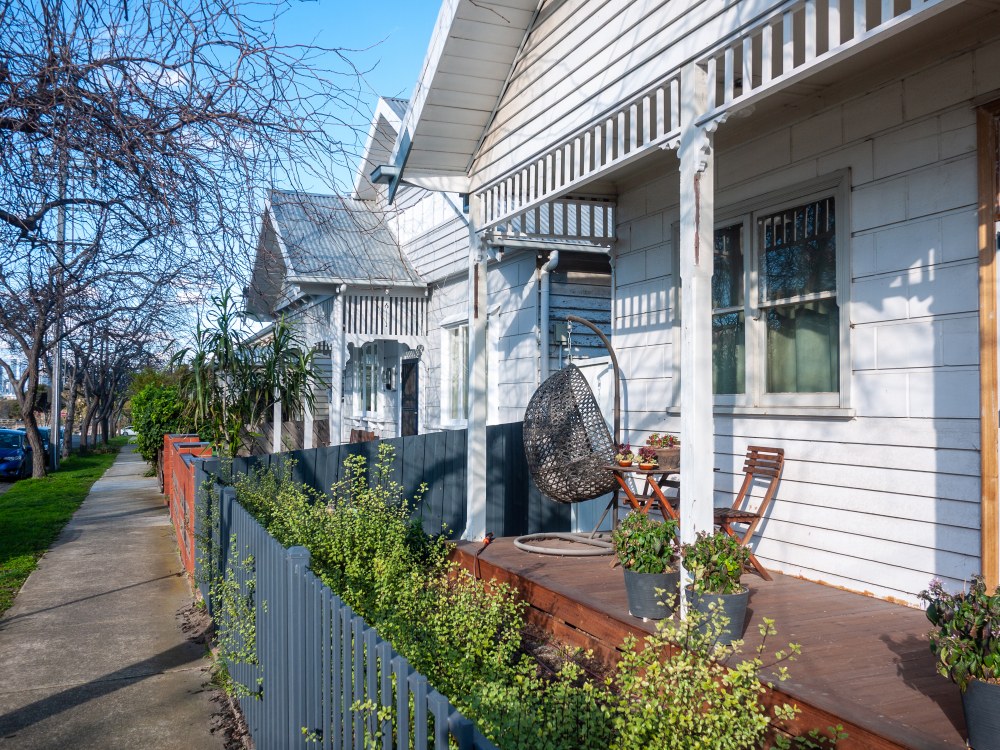Winter, Spring, Summer, Autumn. These four words can haunt just about anyone in the real estate market – because there’s one thing that everyone wants to know.
What is the best time of year to sell my property? And what about the best time to buy?
Winter and Spring are often touted as the best times of the year for sellers, but what season really stands out as the best and what other factors do you need to consider?
I’m here to take a look at the various rationales and some statistics behind them to determine the best time to buy or sell a property.
What Factors Affect House Prices (and is time of year really one of them?)

Before I delve deeper into things, it’s worth asking if the “best time of year to sell real estate” is just a red herring.
Well, yes and no. While you’re studying the calendar to find that “goldilocks” period to sell your house, there could be a dozen other factors that are driving property values up or down, including:
- Supply and Demand in the Current Property Market: If there is a high number of buyers and a scarcity of properties on the market, prices are going to be driven up regardless of the season or month of the year. That’s why they call it a seller’s market. Conversely, if you’re in a buyer’s market, the number of vendors will be higher, interested buyers will be rarer, and prices will trend lower across the entire calendar.
- Location: Where you buy or sell is more powerful than when you buy or sell. The appeal and reputation of your area, proximity to shops, schools, restaurants, hospitals, and universities, inner suburbs vs outer suburbs, and other location-based factors will drive the price of your property up or down.
- Interest rates: Lower interest rates mean more borrowing power, higher budgets, and higher house prices. Interest rate hikes can slow price growth because sellers are able to borrow less and are willing to spend less on a house.
- Property Features, Size, and Type: Generally speaking, if there are two houses in the same area, the bigger house with more attractive features will sell for more, regardless of the time of year. I’m talking about multiple bathrooms, garages, attractive outdoor areas, and more. It’s also worth considering how appealing your property is based on the features and demographics of your area. Are houses, townhouses, or units selling better in your area? A large, multi-storey home will be more appealing in areas that attract growing families and migrant populations with a focus on multi-generational living. But it won’t be as big a seller in areas with an older population that is focused on downsizing and mobility in the home.
- Property and Land Potential: Investors can drive up the value of your property if they see the potential for easy value-adds. If your property and land are prime for renting, renovating, or developing, you will attract a higher price tag.
- First Impressions and Emerging Trends: Don’t underestimate street appeal, interior design, and the general aesthetics of your property, as these factors can drive interest up or down and adjust the value of your house by tens of thousands of dollars in either direction. Similarly, consider emerging trends that are set to last and how these will affect property value – especially if there is policy momentum behind them. For example, energy efficiency features are an increasingly big ticket item for sellers.
- The State of the Economy: When the economy is thriving there are more people employed, getting pay rises, and looking to improve their living conditions. This can drive up consumer confidence and buyer demand, which has a direct correlation with property prices.
So, Does the Time of Year Have Anything to Do with Melbourne Property Prices at All?
It’s a fair question to ask, and like I said, yes and no.
If interest rates are rising all year and we’re stuck in a period of economic turmoil, property prices are going to be lower all year around.
And your location is your location no matter the date on the calendar. Unless your postcode suddenly becomes more or less sought after, when you choose to sell will only have so much impact.
With all that said, supply and demand are probably the biggest factors that can fluctuate based on the month or season you choose to buy or sell your property.
When to Sell Your Property? Winter vs Spring

In the battle for seasonal supremacy, winter and spring are often touted as the best times to sell real estate.
In Melbourne, more properties are listed for sale in Spring than in Winter.
Regardless of the reasons, it’s a basic fact in the residential market – more vendors choose to list in the months leading into Christmas than in any other period. It’s what my data says, and the “Spring Rush” or “Spring Blitz” is a well-known phenomenon in the real estate market.
However, the best month to sell both houses and units in Melbourne is in July, according to research from Swinburne University. July offered the highest prices for sellers – and that’s right in the middle of winter!
So, what’s going on here?
Let’s take a closer look at spring and winter to find out.
Selling Property in Spring – Rationale Plus Pros and Cons
It’s easy to understand the rationale behind selling property in spring.
Melbourne’s cold, dark and dreary winter is on its way out, replaced with refreshing warm weather, light breezes, and blossoming flowers.
For vendors, outdoor areas look their best and more light is pouring into the home. For buyers, the conditions are perfect for attending open houses and gathering outdoors for a hard-fought auction.
And looking at the data, we can see that this is at least partly true.
As I said, spring is when many people choose to sell, but the demand isn’t necessarily keeping up with the supply. The spring seller’s market often morphs into a buyer’s market because prospective homebuyers and investors can always move on to their next option.
So, the advantage of selling in spring is that it’s an active time in the Melbourne real estate market. Additionally, general weather conditions often mean your house and garden will look great and plenty of eyes will be on your property. If your property has the features to stand out, all these factors might come together to net you a higher sale.
But the busyness of the spring property market is also its major drawback. Supply often ends up outstripping demand as more and more sellers are convinced by real estate agents to take advantage of the spring rush. Plenty of prospective buyers might be out and about too, but with so many other options on the market, they’re not necessarily devoted to buying your home. If your property is a little bit lacking, it could easily get lost in the mix and end up selling for less due to a lack of demand for property compared to the sheer supply.
Selling Property in Winter – Rationale Plus Pros and Cons
If you look at the rationale for selling real estate in winter purely from a “weather” perspective, it can be difficult to understand.
Melbourne’s winters offer colder, shorter, and darker days. In the colder months, our property will be starved of the natural light it needs to display well, and even the best-presented gardens can look more like a swamp in low light after some heavy rains. On top of this, the winter weather seems hugely demotivating for would-be buyers who need to inspect properties and shiver through auctions.
But I’m a buyers advocate and property investment advisor in Melbourne – not a meteorologist. So let’s look at the other side of the winter rationale.
Here are the facts. Serious buyers don’t generally take a ‘holiday’ from property inspections just because the season has changed. Buying property is a time-consuming and stressful process; from securing finance approval to choosing suitable suburbs, attending opens, researching sales, and sharing your contact details with agents. It requires serious commitment.
Because of how time-consuming it can be to buy a home or investment property, Buyer Demand remains broadly the same in winter as it is in spring. However, Supply from Vendors is dramatically less in winter, partly for all the weather-related reasons we just listed.
The results should be intuitive, but unfortunately, they’re not widely known.
I have crunched the data and looked at auction activity across 100+ suburbs in Melbourne over a three-year period.
I compared the Number of Auction Campaigns conducted in Winter Vs Spring as well as the Auction Clearance Rates as a percentage.
Yes, far more properties are auctioned in spring than in winter – no surprise there. But, interestingly, a higher proportion of auctions are successful in winter than in spring. Why??
Because a lower supply of properties for sale translates to less choice for buyers and hotter competition at auction.
It’s the basic concept of supply vs demand in action, and it’s the very reason why selling in spring can be so fraught.
Simply put, when 10 buyers see only 2 properties for sale that suit their requirements, interest for each property (as shown by auction bidding) will be strong. But, when 10 buyers see 5 properties for sale that suit their requirements, interest will be diluted, and bidding will be less competitive at some or all of the auctions.
When you combine the data comparing auction clearance rates with the statistics that show July nets the highest property sales, you start to see a clear picture of the benefits of selling in winter.
For what it’s worth, I always prefer to sell during winter.
Winter is pretty much the only period where I strongly consider selling my development properties off-the-plan, and would advise my clients to do the same as their property development consultant in Melbourne.
As a buyers advocate, winter is the time that I have to work my network the hardest for off-market and newly listed opportunities.
So, if you’re a vendor thinking about waiting until Spring, there’s only one piece of advice I can give you. Wake up and ask yourself why you wouldn’t want to list when there are fewer competing properties for sale on the market.
You can make your home feel cosy or try to display right when the winter sun hits your windows, but you can’t overcome the mechanics of supply and demand. So, it literally pays to take your competition out of the equation as much as possible.
What about Selling in Summer and Autumn?

Winter and spring take up so much of the debate that it’s easy to forget that there are two other seasons for selling property in Melbourne.
When it comes to summer, both November and early December can be viable months for selling real estate. But the dead zone in the last week of December is real – with the elephant in the room being the Christmas and New Year period. Following this, January and February are generally good times to start preparing and listing your property in preparation for an autumn sale.
Looking at autumn, it’s fair to say that it’s a bit like spring with a sepia filter thrown over it. Things are cooling down coming out of summer rather than warming up when emerging from winter, and blossoms and greenery are replaced with falling leaves and earthy tones. From a real estate perspective, autumn is busy without being the rush period of spring, so sellers might see some of that “Winter Effect” where buyers have fewer options to choose from, but equally, a few more potential buyers other than the most committed might be drawn to your property.
Other Factors to Consider When Timing the Sale of Your Property
- You need to look at local data when selling your property – including historical information and emerging trends. Commentary about the housing market often makes things look much more macro than they really are. Real property experts know that different areas may tend to favour buyers or sellers at different times of the year. You need to know what your location is doing – down to the postcode.
- Before you list, take a look at the number of listings of homes for sale near you and how many of these property types are directly competing with your own. If there are too few or too many, this could be a sign that now is not the time to sell. Also look at vacancy rates, auction clearance rates, and other important stats.
- The realities of why you are selling should take priority over choosing the best time of year to sell. Whether you’re a homebuyer or an investor, if you’re in a position where you need to sell, there might not be any point waiting.
- Finally, you need to consider all the other factors and forces that can influence market conditions and sale prices, like those mentioned at the top of this article.
What Is the Best Season to Buy Property in Melbourne?

As a buyer, you want a property market where there are plenty of choices and comparatively few buyers to compete with. Once again, winter and spring may be your picks.
Spring is an option for buyers who want to take advantage of the hot “auction season”, where there are rarely enough active buyers to keep up with the properties on offer. You might find yourself outpaced at a few busy auctions, but there will almost always be another option that appeals to you.
Winter is more of a seller’s market where there is a small pool of buyers going to almost every auction. But if you can find a property that suits your needs and the campaign is fairly quiet, there might be a great opportunity to snag a bargain.
Whatever the time of year, the key is to look for those distressed vendors who really need to sell and see if you can take advantage of their willingness to offload their property quickly.
Summary: Is There a ‘Goldilocks’ Season When It’s Best to Buy or Sell?
There are many reasons why property values rise and fall, so it would be disingenuous to say that the season you buy or sell in is the ultimate deciding factor.
But I will happily tell you that you should never rush into buying or selling real estate when you can afford to stop, think, and analyse your options.
And for what it’s worth, I’ll reiterate that I often aim to sell investments and off-the-plan developments in winter, when the supply and demand dynamics shift further in the vendor’s favour.
Do you want to find the sweet spot to buy or sell an investment property in Melbourne? My name is Andrew Stone from Property Analytics, and I can help you master the property cycle to secure wealth-generating investments and development sites.
As your property investment consultant and buyers advocate serving areas like Kew and Ivanhoe, I have an intimate knowledge of the best time and worst time to buy real estate in Melbourne. More importantly, my rigorous, data-driven selection process ensures you target quality properties that can withstand fluctuations in the property cycle and help you achieve your real estate goals.
For more information and to discuss your investment and development goals, please reach out to Property Analytics.

